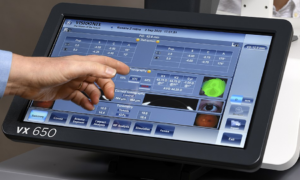August 24, 2022

American consumers have a lot on their minds when looking for a new doctor. Here is what a recent survey reveals about the factors that most influence their decision to visit a healthcare provider’s office.*
According to the poll, conducted by OnePoll on behalf of practice technology provider ModMed, with results synthesized by Talker Research, about three-in-four patients are likely to keep a “mental scorecard” of everything they like and dislike about a doctor’s office.
In this recent poll of 2,000 Americans — including 1,500 with health insurance and 500 without — data showed that almost four in five respondents (79 percent) place importance on things like timeliness and wait time*.
When deciding to stick with the same doctor, two-thirds (67 percent) also place importance on how personable and engaged their doctor is*, and 39 percent have switched doctors because the office staff was not friendly.
In fact, while two-in-five respondents found themselves at a new office because of a change in their insurance, 35 percent did so to find a doctor who’d be a “better fit.”
Overall, nine-in-10 said they place importance on their doctor using the latest technology.* So much so that for 61 percent of respondents, being able to make online appointments is an important factor when deciding whether or not to stick with a doctor*.
Before attending an appointment with a new doctor, 38 percent of respondents said they check out the doctor’s office website, and almost three-quarters (74 percent) place importance on online reviews when selecting a new doctor*.
After the appointment, 59 percent of respondents indicated they are more likely to pay a bill faster if given an online option,* and 44 percent prefer to access test results either online or through a portal.
Other Articles to Explore
The survey found that respondents will give new doctors an average of four chances before moving on.
Although 38 percent of those polled have noticed an influx of new telemedicine or virtual appointment options, another 38 percent prefer to have first-time appointments in-person, as opposed to the 20 percent who prefer a virtual visit.
The survey also suggests that patients want telemedicine to remain an option. While two-thirds (67 percent) of respondents feel that routine, virtual doctor visits are not as effective as in-person, almost one-quarter (22 percent) believe that virtual visits are especially beneficial for urgent or time-sensitive visits.
And when the appointment time arrives, nearly a majority (46 percent) of respondents prefer that their doctor use a tablet to review their medical history or take notes.
These preferences also extend beyond the appointment; 46 percent prefer to request prescription refills through an app, and two-in-five would rather send messages to their doctor virtually.
After their first appointment, respondents were divided on the type of appointment they prefer for a follow-up. One-third favor a mix of both in-person and virtual, compared to those who’d rather have one or the other (37 percent vs 26 percent, respectively).
*Data reflected is a combined stat of “very important’”and “somewhat important,” “very likely’”and “somewhat likely”, or “strongly agree’”and ‘somewhat agree’, as applicable.

























